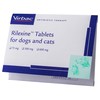Rilexine
Rilexine Tablets are indicated for the treatment of infections of the urinary tract in cats and dogs (such as nephritis and cystitis), and cutaneous infections (pyoderma) in dogs, including skin fold pyoderma impetigo, folliculitis, furunculosis and cellulitis.
Rilexine Tablets are cream coloured oblong tablets with small brown spots. They can be divided into halves and are well accepted by cats and dogs, although they may be crushed or added to food if necessary.
Rilexine 600mg Palatable Tablet
£0.74Rilexine 600mg Tablets are indicated for the treatment of infections of the urinary tract in cats and dogs (such as nephritis and cystitis). They can also be used to treat cutaneous...[More info]
Rilexine 300mg Palatable Tablet
£0.61Rilexine 300mg Tablets are indicated for the treatment of infections of the urinary tract in cats and dogs (such as nephritis and cystitis). They can also be used to treat cutaneous...[More info]
Rilexine 75mg Palatable Tablet
£0.40Rilexine 75mg Tablets are indicated for the treatment of infections of the urinary tract in cats and dogs (such as nephritis and cystitis). They can also be used to treat cutaneous...[More info]
Contra-indications, warnings, etc
Do not use in animals known to be hypersensitive to penicillins and cephalosporins.
Do not use in rabbits, guinea pigs, hamsters and gerbils.
Special precautions for use in animals
As with other antibiotics which are excreted mainly by the kidneys, unnecessary accumulation may occur in the body when renal function is impaired. In case of known renal insufficiency, the dose should be reduced and antimicrobials known to be nephrotoxic should not be administered concurrently.
This product should not be used to treat puppies of less than 1 kg of bodyweight or kittens under 9 weeks of age.
Use of the product deviating from the instructions given in the S.P.C. may increase the prevalence of bacteria resistant to Cefalexin and may decrease the effectiveness of treatment with other cephalosporins and penicillins, due to the potential for cross-resistance.
Use of the product should be based on susceptibility testing of the bacteria isolated from the animal. If this is not possible, therapy should be based on local epidemiological information.
Official, national and regional antimicrobial policies should be taken into account when the product is used.
As the tablets are palatable to animals there is a danger of excessive ingestion. The tablets must therefore be stored out of the reach of animals.
Local treatment of cutaneous and subcutaneous infections in cats should be considered as a complement of the antibiotic treatment.
Special precautions to be taken by the person administering the veterinary medicinal product to animals
Penicillins and cephalosporins may cause hypersensitivity (allergy) following injection, inhalation, ingestion or skin contact. Hypersensitivity to penicillin may lead to cross sensitivity to cephalosporin and vice versa. Allergic reactions to these substances may occasionally be serious.
1- Do not handle this product if you know you are sensitised or if you have been advised not to work with such preparations.
2- Handle this product with great care to avoid exposure, taking all recommended precautions. Wash hands after use.
3- If you develop symptoms following exposure such as skin rash, you should seek medical advice and show the doctor this warning. Swelling of the face, lips or eyes or difficulty with breathing are more-serious symptoms and require urgent medical attention.
Adverse reactions (frequency and seriousness)
Very rare cases of soft faeces and vomiting may be observed in animals during treatment.
Hypersensitivity to Cefalexin is rare, however, the product should not be administered to animals which are known to be hypersensitive to Cefalexin or penicillin.
Allergic cross-reactivity with other β-lactams may occur.
Use during pregnancy, lactation or lay
The product can be used in pregnant and lactating animals.
Interaction with other medicinal products and other forms of interaction
The association of first-generation cephalosporins with aminoglycoside antibiotics and some diuretics such as furosemide can enhance nephrotoxicity risks.
The bactericidal activity of cephalosporins is reduced by concomitant administration of bacteriostatic acting compounds (tetracyclines, chloramphenicol, macrolides and rifampicin).
Pharmaceutical precautions
Keep out of reach of children. Protect from light.
